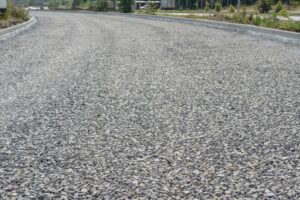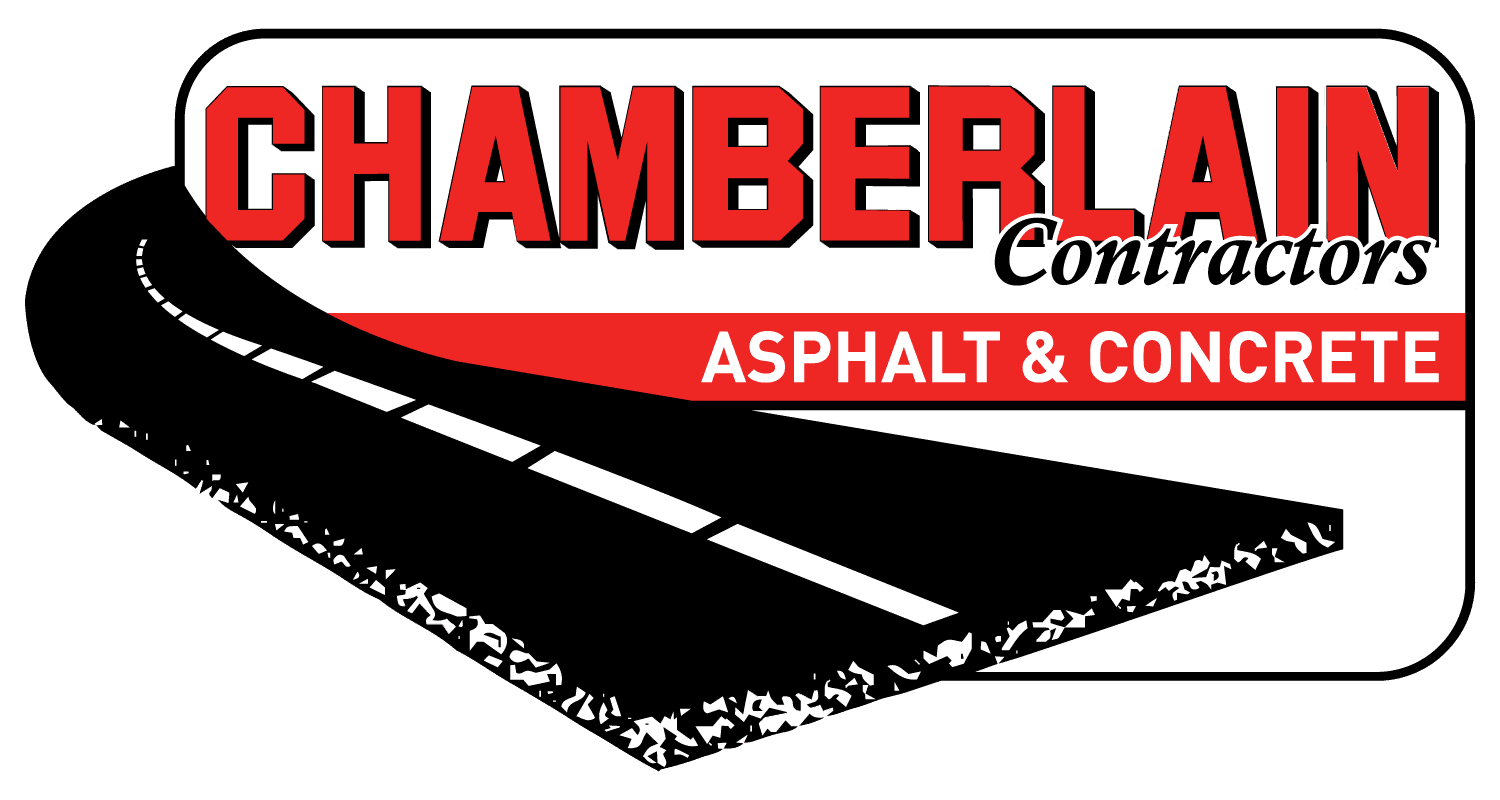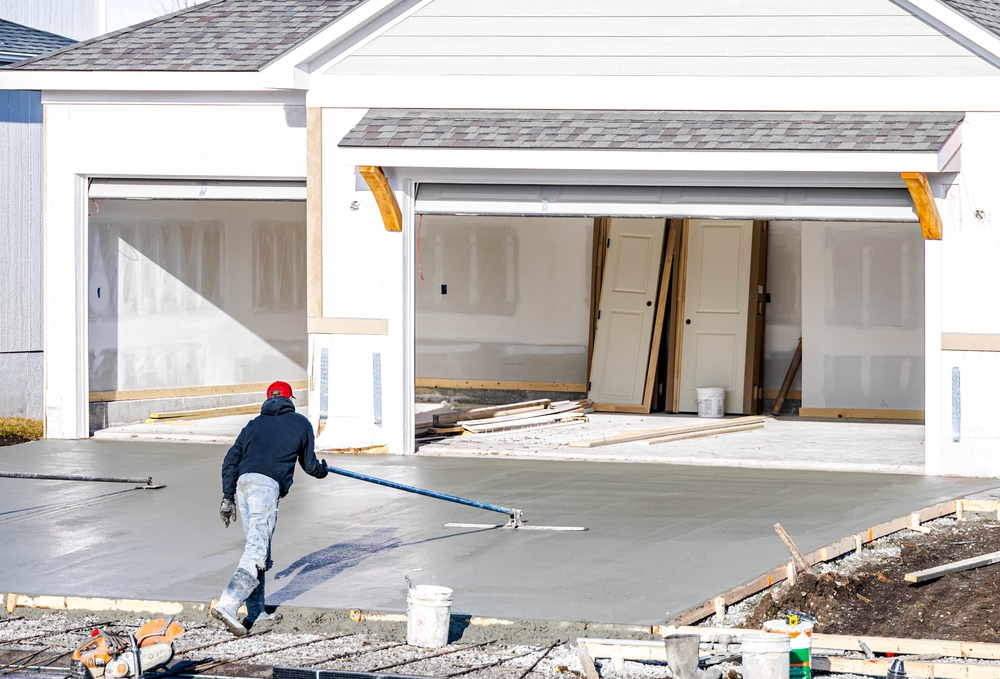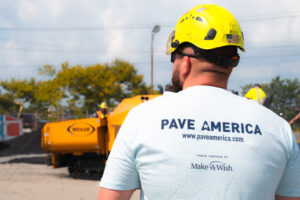Table of Contents
When planning a new parking lot, driveway, or roadway, one of the most important decisions is choosing between asphalt vs. concrete paving. Both materials offer distinct advantages, and the best option for your project depends on factors like budget, climate, usage, and long-term maintenance.
Asphalt is often praised for its affordability and fast installation, while concrete stands out for its durability and custom finish options. In this guide, we’ll walk through the pros, cons, costs, and performance of both paving solutions to help you make the right choice for your commercial property.
The Pros and Cons of Asphalt Paving
Asphalt is a black, petroleum-based paving material made from a blend of crushed stone, sand, and gravel, bound together with asphalt cement. Its flexible structure and quick curing time make it a common choice for commercial roadways, driveways, and parking lots.
Asphalt paving is especially valued for its cost-efficiency and ability to perform well in colder climates. Here are some of its most common advantages and disadvantages to help you determine if it’s the right surface for your project.
Advantages of Asphalt
1. Cost-Effective
Asphalt installation typically costs less than concrete. It’s a budget-friendly choice for large-scale projects such as parking lots or long roadways, helping property owners stay within budget without sacrificing quality.
2. Quick Installation
Unlike concrete, which can take several days to cure fully, asphalt sets much more quickly. This makes it a convenient choice for time-sensitive commercial projects where reducing downtime is critical.
3. Flexible Surface
Asphalt’s slightly flexible surface allows it to adjust to minor ground shifts and heavy traffic loads. This reduces the likelihood of surface cracking, which can lead to frequent and costly repairs.
4. Less Complex Repair Process
Asphalt is significantly easier to repair. Minor surface damage, such as cracks or potholes, can often be fixed without replacing the entire surface. This reduces business disruption and repair costs, making it an ideal material for maintenance-focused property managers.
5. Cold Weather Performance
Considering asphalt vs. concrete paving for a property in a cold climate? Asphalt generally performs better in freezing conditions due to its flexibility. It adapts more easily to temperature changes, reducing the risk of cracking and surface damage caused by freeze-thaw cycles.
Disadvantages of Asphalt
1. Shorter Lifespan
Although asphalt is durable, it typically has a shorter lifespan than concrete. Depending on your property’s specific weather and traffic patterns, most asphalt surfaces last between 15 to 25 years with proper maintenance.
2. Needs Routine Upkeep
To stay in top condition, asphalt surfaces require regular upkeep, such as sealcoating. Without routine maintenance, the surface may degrade faster and require more frequent repairs.
3. Sensitivity to Heat
Asphalt is more prone to heat absorption, which means that in high temperatures it can become soft and sticky, causing rutting or deformation. This is especially common in parking lots or roadways that are exposed to direct sunlight for extended periods.

The Pros and Cons of Concrete Paving
Concrete is a light-colored, rigid paving material made from cement, water, sand, and coarse aggregates. Once it sets, it forms a tough, long-lasting surface that can handle heavy traffic and daily wear.
When comparing asphalt vs. concrete paving, concrete often wins points for its ability to withstand extreme heat and customizable appearance, from clean, uniform finishes to decorative textures and colors.
Let’s break down the key advantages and disadvantages of choosing concrete for your next paving project.
Advantages of Concrete
1. Longevity
While asphalt typically needs replacement in 15 to 25 years, concrete surfaces can last 30 to 40 years or longer with proper installation and care, making it a smart long-term investment.
2. Minimal Upkeep Required
Compared to asphalt, concrete surfaces need much less routine maintenance. There’s no need for frequent seal coating or resurfacing, which saves on long-term upkeep costs.
3. Resistant to Heat
Concrete reflects sunlight rather than absorbing it. This helps reduce surface temperatures in hot climates, making it more comfortable for pedestrians and more stable for vehicle traffic in properties in warmer regions.
4. Personalized Appearance
Concrete offers the perfect blend of durability and aesthetics. It can be stamped, stained, or colored to achieve a wide range of custom finishes, from decorative borders to textured walkways, enhancing the curb appeal of any commercial property.
5. High Load Capacity
Concrete offers strong support under constant or heavy vehicle traffic and loads. Its rigid structure makes it a go-to choice for high-load areas like commercial roadways, loading docks, and warehouse entrances where long-term durability is a must.
Disadvantages of Concrete
1. Higher Upfront Cost
One of the biggest drawbacks of concrete is its higher initial installation cost compared to asphalt. This can be a barrier for budget-conscious projects or large-scale commercial surfaces.
2. Extended Installation and Curing Period
Concrete often takes longer to install and fully cure than asphalt. Typically, it can take several days before the road is ready for traffic, resulting in longer downtime for paving projects.
3. Prone to Cracking
Concrete lacks flexibility, so it doesn’t absorb ground movement as well as asphalt. In areas with frequent freeze-thaw cycles or shifting soil, cracks can form more easily and may require patching or resurfacing to maintain the surface.
4. Complicated Repairs
Concrete repairs tend to be more involved than asphalt. Instead of quick patching, damaged sections often need to be cut out and replaced entirely, which can be time-consuming, costly, and may disrupt surrounding areas.
5. Vulnerability in Cold Weather
Freezing temperatures can take a toll on concrete. As moisture works its way into small cracks and freezes, it expands, causing the surface to break down over time. If you’re weighing asphalt vs. concrete paving for a property that sees harsh winters, asphalt may hold up better in the long run.
Cost Comparison and Value
When selecting the right paving solution for your property, balancing cost and long-term value is essential. While asphalt may seem more affordable upfront due to its lower installation costs, concrete tends to offer better value over time.
Concrete’s longer lifespan, reduced maintenance requirements, and strong resistance to weather-related damage make it a smart investment, especially for high-traffic or time-sensitive commercial properties where minimizing repairs and disruptions is critical.
Weather and Climate Considerations
Whether you live in Maryland, Virginia, Pennsylvania, Delaware, or any of the surrounding areas, the weather plays a major role in determining the lifespan of your pavement. Concrete’s light color and rigid structure allow it to withstand intense sunlight and resist heat-related damage. When properly installed and sealed, it also fares well against freeze-thaw cycles.
Asphalt, meanwhile, performs best in cooler to moderate climates. In hotter areas, it can soften, develop ruts, or wear down more quickly without regular maintenance. Selecting the right material for your local climate can significantly impact both the performance of your pavement and the maintenance required.
Environmental Considerations
If you’re conscious about the environment and are looking for sustainable pavement, there are a few factors to consider when choosing between asphalt vs. concrete paving.
- Concrete: Has a higher carbon footprint due to the energy-intensive process of manufacturing cement. Stays cooler, but is less recyclable.
- Asphalt: Made from petroleum, but is more recyclable. Old asphalt can be reclaimed and reused, incorporating recycled materials into new projects. However, its dark color can increase the heat impact.
Ultimately, the best choice depends on whether your priority is minimizing the initial environmental impact or prioritizing sustainability throughout the pavement’s lifespan.
Surface Durability and Functionality
When comparing the difference between asphalt and concrete, long-term durability is often a top concern, especially for commercial properties that see heavy loads and constant traffic. These conditions increase wear and tear, so a durable paving solution makes a big difference.
- Concrete offers a rigid, durable surface that performs well under heavy pressure. It’s ideal for high-traffic areas, such as warehouse floors, truck lanes, and industrial lots. It also provides stable footing for pedestrians and holds up well over time with minimal surface shifting.
- Asphalt provides a smoother ride, making it ideal for roads and driveways. However, it’s more vulnerable to cracking, rutting, and surface breakdown, especially without routine upkeep like crack filling or pothole repairs.
Ultimately, choosing the right material means balancing durability, performance, and how much ongoing maintenance your surface will require.
Selecting the Surface That’s Right for You
Both asphalt and concrete paving offer reliable performance, but each has trade-offs that matter depending on your priorities.
Asphalt is best for fast installation, flexible performance, and lower initial costs. Concrete stands out for its long lifespan, load-bearing strength, and customizable design options.
To make the right decision for your property, consider:
- Expected traffic (volume and load weight)
- Climate conditions
- Maintenance budget and schedule
- Aesthetic preferences
- Timeline for completion
At Chamberlain Contractors, our team can help you choose between asphalt and concrete for your commercial property—speak with one of our paving specialists today!
Contact Chamberlain Contractors for Your Asphalt Paving & Concrete Needs
Whether you’re considering asphalt paving for its fast turnaround and affordability or exploring concrete paving for its strength and longevity, the right solution starts with an expert partner.
At Chamberlain Contractors, we specialize in commercial paving solutions throughout Maryland, Northern Virginia, Southern Pennsylvania, Delaware, and the D.C. Metro area. Our team delivers high-quality installation, expert guidance, and long-term support across every stage of your paving project, from design and materials to maintenance and repairs.
Whether you need new pavement or expert repairs, we offer durable, cost-effective services tailored to your property. Contact us today to get the surface solution that works best for your property.
Frequently Asked Questions
1) What makes concrete paving different from asphalt?
Concrete is made from cement and water, resulting in a rigid, light-colored structure that provides excellent load support and longevity for high-traffic and warmer climate surfaces. Asphalt is a petroleum-based, black, and flexible material, ideal for fast installation and cold-weather performance.
2) Can concrete paving crack?
Yes, concrete can crack over time, especially in areas with freeze-thaw cycles or shifting ground. Proper installation and maintenance can reduce the likelihood and severity of cracks.
3) Is asphalt paving a cheaper option?
Yes, asphalt typically costs less to install than concrete. However, it typically requires more frequent maintenance or a replacement every 15 to 20 years. Although more expensive to install, concrete has an extended lifespan and lower maintenance costs over time.
4) Should climate influence the choice between asphalt paving and concrete paving?
Yes, your local climate influences which paving material will perform best. Asphalt performs better in cold or moderate climates, while concrete is more suitable for regions with high temperatures or intense sunlight.
5) Can I customize the look of concrete paving?
Yes, concrete is highly customizable. It can be stamped, stained, or colored to achieve decorative patterns, textured finishes, or branded appearances, making it perfect for upscale commercial entries or retail properties.
6) Which is better for commercial projects?
It depends on your property’s priorities. For fast installs and lower upfront cost, asphalt is a great choice. For longevity, load capacity, and curb appeal, concrete paving is often the better choice, especially for high-traffic commercial sites.




